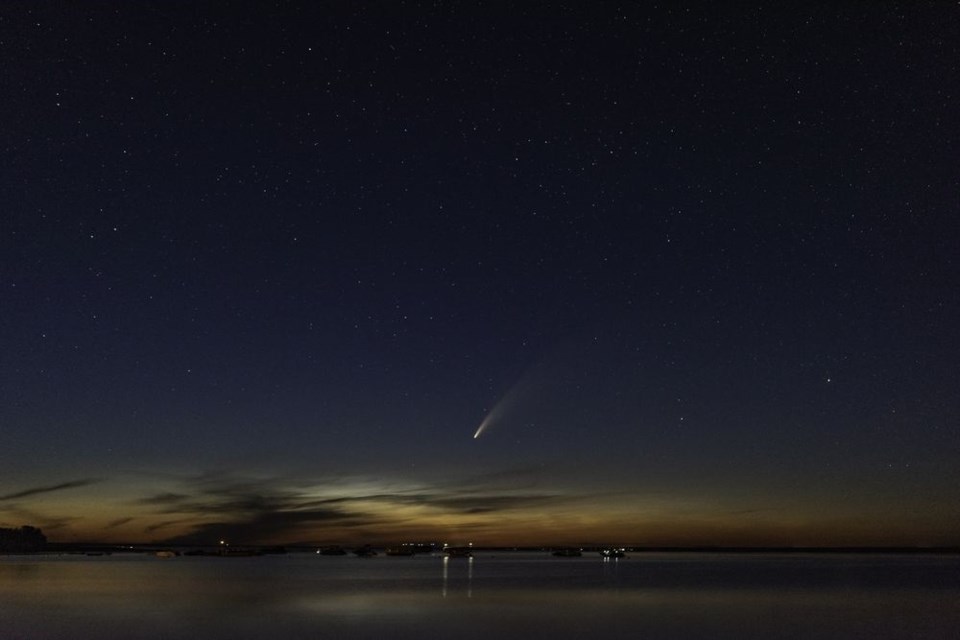Notanee Bourassa has a long-time passion for photography, which brought him to Canora on the night of July 11 and 12 as the Comet NEOWISE was passing over the Canora region. Bourassa, who lives in Regina, said he has been interested in photography since he began storm chasing.
“I decided to come to Canora for NEOWISE because I have three large pieces of work in a top level display case at a local shop at Canora Cannabis,” he said. “The other reason is that I was shooting sunset at Sandy Beach and the clouds with NEOWISE at Good Spirit Lake. Canora wasn’t too far from where I already was, and was a beautiful foreground for the night sky including the comet.
“From my limited knowledge about the comet, it comes through the solar system every 7,000 years and has been the best comet we’ve seen up here in Canada for a least a decade. To me every night counts.”
He said there are multiple ingredients required to produce top quality photos of a comet.
“Number one, a tripod for your DSLR or mirrorless camera,” said Bourassa. “For an everyday camera, I would suggest 3200 ISO at f/4.5 for about seven seconds to start your initial exposures, then adjust your settings as you see fit.
“The second secret to taking good photographs is a large amount of patience, planning and seizing the opportunity by taking action instead of being complacently comfortable at home.”
Bourassa said he thoroughly enjoyed his first visit to Canora and the surrounding area.
“You have friendly people, beautiful houses and trees, parks, churches and more, a photographer’s feast,” he enthused. “I’d love to return to do more.”
Bourassa works as a technician for SaskTel and has a professional photography business on the side.
“My main themes for my photography are northern lights, milky way, nightscapes, severe thunderstorms, tornados, lightning and any beautiful landscapes,” he explained. “I am dabbling in portrait photography if I can incorporate the above themes. I am also a professional second shooter for weddings.”
While his interest in outdoor photography is quite broad, he has a contagious enthusiasm for storm chasing.
“One of my favourite storm chases of all time was in late May of 2016 for what is known as the Dodge City Kansas tornado,” Bourassa recalled. “It was very photogenic and the road network was good enough to get in close vicinity. Only extremely experienced chasers dare to do that and they are usually prepared with armour-plated vehicles or at least grills to protect their windshields from detonation from hail with roll cages to protect you when the winds hit you from the side. A good idea is to wear a safety helmet and goggles for the most intense of storms.”
His first tornado experience was with the Regina tornado in 1979, which hit very close to home.
“It touched down a few blocks south of where I lived,” said Bourassa. “I took an interest in weather immediately and earned top marks in elementary school when it came to cloud recognition and forecasting. This was pretty much responsible for the initial thrust of my interest in severe weather.
“I love storm chase photography because I love being close to the action, the roaring thunder, the pouring rain, experiencing insane winds and hail. Seeing the prize of a tornado is like winning the Grey Cup. It is an ultra difficult, expensive but extremely rewarding hobby. I also make storm reports to Environment Canada as a trained CANWARN spotter. I love the images and the experience as well as the fellow storm chasers you meet on the road and in the steakhouses. The celebration after a great chase is a fantastic climax to any severe weather day.”
Even though storm chasing involves intense action and potential danger, Bourassa said it also requires a considerable amount of patience and dedication to the craft.
“Storm chasing takes a lot of time,” he explained. “You need to read and become good at forecasting in order for your chase adventures to be economically viable. So there’s the night before the storm, doing the forecasting and consulting various weather models and consulting opinions of other chasers and watching statements of meteorologists. Then comes the hours of driving to get to your target area where storms will initiate, followed by waiting even longer for them to actually initiate. Then you make the best decision you can according to your abilities and give it your all.”
After many years of experience, Bourassa has some practical advice for school-aged young people who may be interested in photography as a career.
“Capture the beauty you see in everything. It starts from the heart,” he encouraged. “You love those flowers, that landscape or that falling down old barn. Take your shot. The more you shoot, the better you become. Carry the camera with you everywhere you go. See people making their emotions, capture the joy, the fun. It won’t take long for you to be known for the images you take and word of mouth spreads that so-and-so is a good photographer.
“Remember it’s not the equipment, it’s the person holding the camera. You can even start with a cell phone and work your way to a bigger camera later. Watch YouTube videos on the Rule of Thirds and The Golden Mean. Learn about composition.
“Photography can take you places. Let your art be seen. Take criticism lightly and keep true to yourself.”
Bourassa’s work can be viewed on online, including his website www.iamthestorm.photography.




